Visiting eco-friendly tea farms offers a unique sustainable travel experience. You'll witness organic cultivation methods, biodiversity conservation efforts, and fair trade practices firsthand. These farms prioritize environmental stewardship, using natural pest control and water conservation techniques. You can immerse yourself in local culture through homestays and traditional tea ceremonies, while participating in hands-on harvesting activities. Many farms offer zero-waste tours, showcasing their commitment to reducing environmental impact. By choosing these destinations, you'll support local communities and learn about sustainable agriculture. Exploring eco-friendly tea farms provides a perfect blend of education, cultural exchange, and responsible tourism.
Eco-Friendly Tea Farming Methods
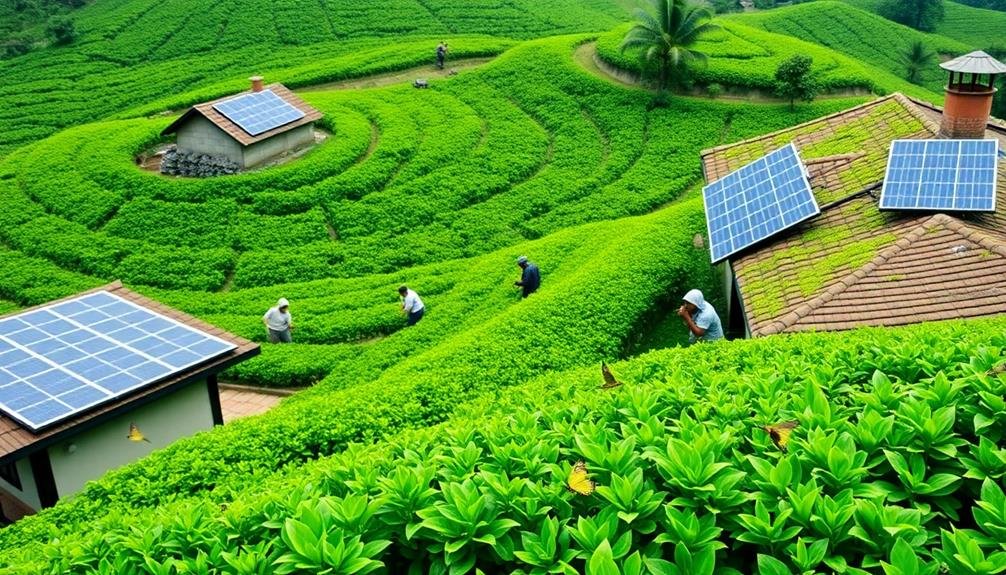
Tea leaves rustle in the gentle breeze as eco-friendly farming methods take root. You'll witness sustainable practices that protect both the environment and tea quality.
These farms prioritize organic cultivation, eschewing harmful pesticides and synthetic fertilizers. Instead, you'll see natural pest control methods like companion planting and the use of beneficial insects.
As you explore, you'll notice how these farms conserve water through efficient irrigation systems and rainwater harvesting. They often implement terracing and contour plowing to prevent soil erosion on hillsides.
You'll learn about their composting efforts, which enrich the soil naturally and reduce waste.
Many eco-friendly tea farms also focus on biodiversity, maintaining diverse ecosystems that support local wildlife. You might spot shade trees interspersed among tea plants, providing habitat for birds and regulating temperature.
Some farms even integrate renewable energy sources, like solar panels, to power their operations.
Biodiversity at Sustainable Tea Estates
Amidst the lush green rows of tea plants, you'll discover a thriving ecosystem at sustainable tea estates. These farms prioritize biodiversity, creating habitats for various plant and animal species.
You'll notice native trees interspersed among the tea bushes, providing shade and supporting local wildlife. As you walk through the estate, you might spot colorful butterflies fluttering between flowers or hear the melodious songs of diverse bird species.
Sustainable tea farms often maintain wildlife corridors, allowing animals to move freely through the landscape. You'll see how these estates protect water sources, preserving aquatic ecosystems and ensuring clean water for both wildlife and tea production.
Many eco-friendly tea farms also cultivate diverse crops alongside tea, enhancing soil health and providing additional habitats. You'll find herbs, spices, and fruit trees that contribute to the farm's biodiversity.
Organic Tea Production Process
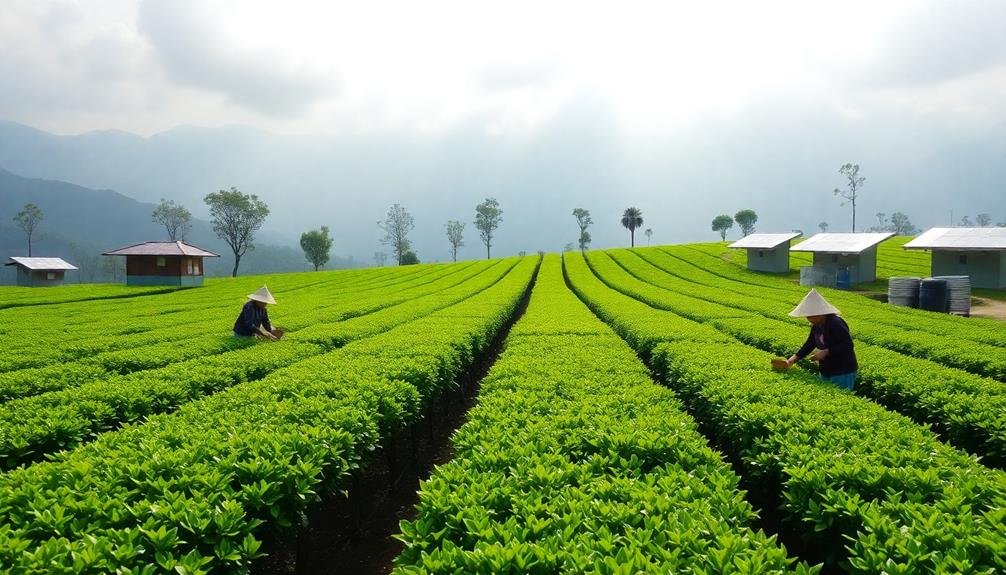
As you explore the tea estate, you'll witness the meticulous organic tea production process firsthand. You'll see workers carefully plucking only the freshest tea leaves, ensuring the highest quality harvest.
The leaves are then quickly transported to the processing facility to preserve their flavor and nutrients.
In the withering room, you'll observe how the leaves are spread out on large trays, allowing excess moisture to evaporate. This essential step enhances the tea's aroma and prepares it for rolling.
Next, you'll watch as the leaves are gently rolled to release their natural oils and initiate oxidation.
The oxidation process, which determines the tea's final flavor profile, is closely monitored by skilled artisans. For green teas, oxidation is minimal, while black teas undergo full oxidation.
You'll learn how organic farmers use natural methods to control this process without harmful chemicals.
Fair Trade Practices
Many eco-friendly tea farms have embraced fair trade practices, ensuring ethical treatment of workers and sustainable community development. When you visit these farms, you'll witness firsthand how fair trade principles are implemented.
You'll see workers receiving fair wages, safe working conditions, and access to healthcare and education.
Fair trade certification requires farms to meet specific social, economic, and environmental standards. This means you can be confident that your visit supports ethical practices.
You'll observe how fair trade premiums are invested back into the community, funding projects like schools, clinics, and clean water systems.
During your tour, you'll learn about the farm's commitment to gender equality and empowerment of women workers.
You might even have the opportunity to speak with farmers and workers about how fair trade has improved their lives.
Cultural Immersion Experiences
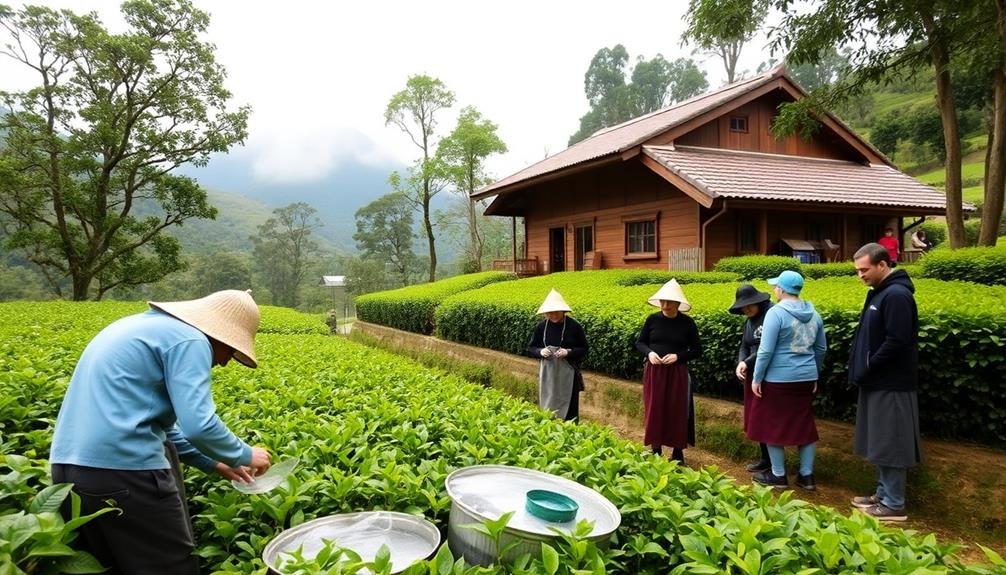
Visiting eco-friendly tea farms offers more than just fair trade insights; it's a gateway to rich cultural experiences. You'll immerse yourself in local traditions, customs, and ways of life that have been shaped by centuries of tea cultivation.
As you explore these farms, you'll interact with local farmers, learn about their daily routines, and gain a deeper understanding of the region's cultural heritage.
Many eco-friendly tea farms offer homestay programs, allowing you to live with local families and experience their way of life firsthand. You'll participate in traditional activities, such as tea ceremonies, cooking classes, and local festivals.
These experiences provide a unique opportunity to connect with the community and develop a genuine appreciation for their culture.
During your visit, you might:
- Learn traditional tea-making techniques from experienced farmers
- Participate in local rituals and celebrations related to tea harvesting
- Explore nearby temples or historical sites significant to the region's tea culture
- Engage in conversations with community elders to understand the area's oral history
Environmental Conservation Efforts
As you explore eco-friendly tea farms, you'll encounter robust environmental conservation efforts.
You'll witness soil and water protection measures, alongside initiatives aimed at preserving local biodiversity.
You'll also observe practices designed to reduce the farm's carbon footprint, showcasing a commitment to sustainable agriculture and responsible tourism.
Soil and Water Protection
Eco-friendly tea farms consistently prioritize soil and water protection as part of their environmental conservation efforts.
You'll witness firsthand how these farms implement sustainable practices to maintain healthy soil and preserve water resources. They use organic fertilizers and natural pest control methods to prevent chemical runoff, which can contaminate nearby water sources and harm local ecosystems.
You'll learn about innovative irrigation techniques that minimize water waste and maximize efficiency. Many eco-friendly tea farms have implemented rainwater harvesting systems and drip irrigation to reduce their reliance on local water supplies.
They also practice soil conservation through methods like terracing and contour plowing to prevent erosion and maintain soil fertility.
During your visit, you'll discover how these farms:
- Use cover crops to improve soil health and prevent nutrient loss
- Implement buffer zones to protect water sources from agricultural runoff
- Rotate crops to maintain soil fertility and reduce pest pressure
- Employ mulching techniques to conserve soil moisture and suppress weeds
Biodiversity Preservation Initiatives
Biodiversity preservation stands as another cornerstone of eco-friendly tea farms' environmental conservation efforts. When you visit these farms, you'll witness a variety of initiatives designed to protect and enhance local ecosystems. Many farms maintain buffer zones around their tea fields, creating habitats for native plants and animals. These areas act as wildlife corridors, allowing species to move freely and maintain genetic diversity.
You'll often find that eco-friendly tea farms integrate diverse plant species within their tea gardens. This practice, known as agroforestry, provides shade for tea plants, prevents soil erosion, and supports a wider range of wildlife.
Some farms even dedicate portions of their land to reforestation projects, planting native tree species to restore natural habitats.
During your visit, you might encounter pollinator gardens filled with nectar-rich flowers to attract bees, butterflies, and other beneficial insects. Many farms also implement integrated pest management strategies, reducing reliance on harmful pesticides and promoting natural predator-prey relationships.
Reduced Carbon Footprint Practices
When you step onto an eco-friendly tea farm, you'll quickly notice their commitment to reducing carbon emissions. These farms implement various practices to minimize their environmental impact and combat climate change.
You'll see solar panels harnessing renewable energy to power processing facilities and offices. Many farms have also switched to electric vehicles for on-site transportation, further reducing their reliance on fossil fuels.
Eco-friendly tea farms prioritize sustainable farming methods that naturally sequester carbon. They often use organic fertilizers and employ crop rotation techniques to maintain soil health without harmful chemicals.
You'll find that these farms are passionate about educating visitors on their carbon reduction efforts, encouraging sustainable practices beyond the farm gates.
Here are some common carbon footprint reduction practices you might encounter:
- Rainwater harvesting systems for irrigation
- Energy-efficient processing equipment
- Composting programs to reduce waste
- Agroforestry techniques to increase carbon sequestration
Sustainable Packaging Solutions
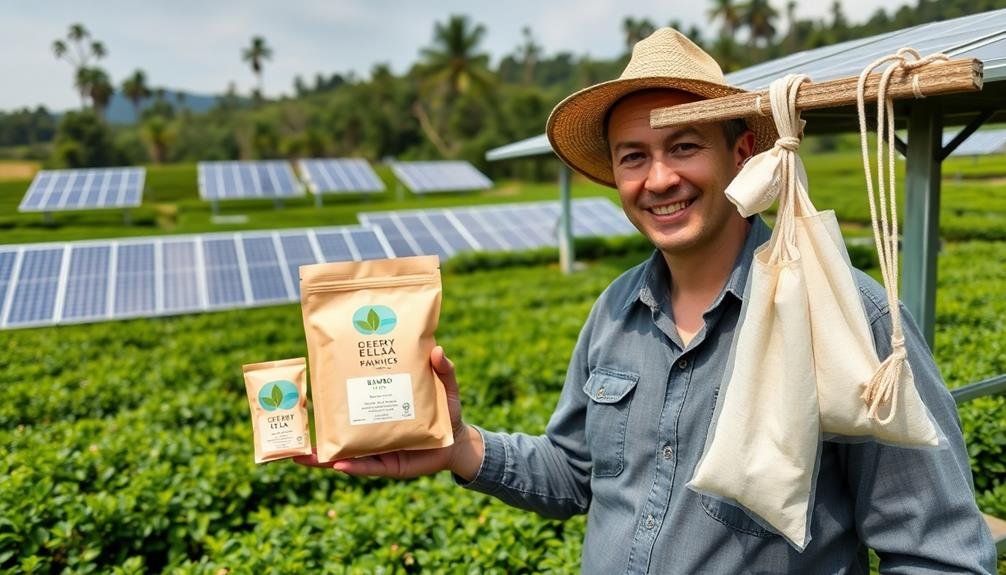
The packaging of tea products plays an essential role in sustainable farming practices. When you visit eco-friendly tea farms, you'll notice their commitment to sustainable packaging solutions. These farms prioritize recyclable and biodegradable materials for their tea products, reducing waste and environmental impact.
You'll find that many eco-conscious tea farms use compostable tea bags made from plant-based materials like cornstarch or hemp. They've also switched to paper labels and tags, eliminating plastic components.
For loose leaf teas, you'll see reusable tins or paper bags replacing single-use plastic containers. Some innovative farms have adopted minimalist packaging designs, reducing overall material usage while maintaining product integrity.
You might encounter tea products wrapped in recycled paper or packaged in glass jars that customers can repurpose. Eco-friendly tea farms often partner with local artisans to create handmade, sustainable packaging solutions.
This not only supports the local economy but also guarantees unique, environmentally friendly packaging options.
Traditional Tea Brewing Techniques
As you explore eco-friendly tea farms, you'll encounter traditional brewing techniques that have stood the test of time.
You'll witness ancient tea preparation methods, such as the Chinese gongfu ceremony or Japanese tea ritual, which emphasize mindfulness and precision.
You'll also discover artisanal steeping practices and regional brewing variations that showcase the unique cultural heritage of each tea-producing area.
Ancient Tea Preparation Methods
Steeped in centuries of tradition, ancient tea preparation methods offer a fascinating glimpse into the rich history of tea culture.
As you explore eco-friendly tea farms, you'll discover these time-honored techniques that have been passed down through generations. From the intricate Chinese Gongfu ceremony to the meditative Japanese tea ritual, each method reflects the unique cultural values and customs of its origin.
You'll learn how different tea varieties require specific preparation methods to unveil their full potential. For example, green teas are often steeped at lower temperatures to preserve their delicate flavors, while oolong teas benefit from multiple short infusions to reveal their complex notes.
Some ancient tea preparation methods you might encounter include:
- Whisking powdered matcha in a traditional tea bowl
- Brewing pu-erh tea in a Yixing clay teapot
- Preparing Turkish tea in a double-tiered çaydanlık
- Serving Tibetan butter tea churned with yak butter and salt
Artisanal Steeping Practices
Mastery of artisanal steeping practices is essential for releasing the full potential of eco-friendly teas. When you visit sustainable tea farms, you'll learn how to bring out the best flavors and aromas from each variety.
Start by selecting the right water temperature for your chosen tea. Green and white teas require cooler water (around 160-180°F), while black and oolong teas prefer hotter water (190-212°F).
Pay attention to steeping times, as they vary greatly between tea types. Green teas typically need only 1-3 minutes, while oolong and black teas can steep for 3-5 minutes. Herbal infusions often benefit from longer steeping times of 5-7 minutes.
Use the appropriate amount of tea leaves, usually one teaspoon per cup, but adjust according to personal taste and tea strength.
Experiment with different steeping vessels, such as clay teapots, glass infusers, or traditional gaiwans. Each material can influence the tea's flavor profile.
Don't forget to appreciate the visual aspect of steeping, watching the leaves unfurl and the water change color. By mastering these artisanal techniques, you'll elevate your tea-drinking experience and gain a deeper appreciation for sustainable tea production.
Regional Brewing Variations
Travelers exploring sustainable tea farms will discover a rich tapestry of regional brewing variations.
You'll encounter diverse techniques that reflect local cultures and traditions, each offering a unique perspective on the art of tea preparation.
As you journey through different regions, you'll notice how brewing methods vary considerably:
- In China, you might experience Gongfu tea ceremony, where tea is steeped multiple times in small clay pots.
- Japanese tea farms may introduce you to the meditative practice of Chanoyu, emphasizing mindfulness and aesthetics.
- In India, you'll likely encounter the popular Masala Chai, brewed with milk and aromatic spices.
- Moroccan tea farms might showcase their signature mint tea, poured from a height to create a frothy texture.
These regional variations aren't just about taste; they're windows into the local way of life.
You'll learn how factors like climate, available utensils, and cultural preferences have shaped these practices over centuries.
Hands-On Tea Harvesting Activities
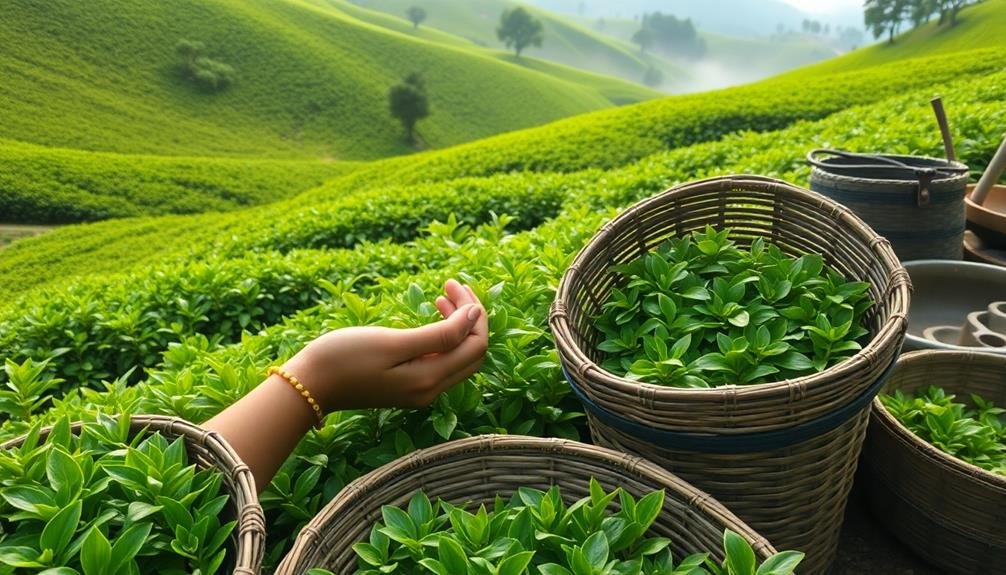
Many eco-friendly tea farms go above and beyond by offering visitors a chance to immerse themselves in the tea production process firsthand. You'll find opportunities to participate in hands-on tea harvesting activities, giving you a deeper appreciation for the craft and labor involved in producing your favorite brew.
During these activities, you'll learn the proper techniques for plucking tea leaves, often using traditional methods that have been passed down for generations. You'll discover how to identify the right leaves to pick, ensuring only the freshest and highest quality leaves make it into production.
As you work alongside experienced tea pickers, you'll gain insights into the challenges and intricacies of this meticulous process. Some farms even allow you to process the leaves you've harvested, guiding you through steps like withering, rolling, and oxidation.
This hands-on experience not only educates you about sustainable farming practices but also connects you directly to the land and the people who cultivate it. By participating in these activities, you're supporting eco-friendly initiatives and contributing to the preservation of traditional tea-making methods, all while creating unforgettable memories.
Zero-Waste Tea Farm Tours
You'll witness firsthand how eco-conscious tea farms prioritize minimal packaging practices during your zero-waste tour.
These farms often showcase their innovative composting and recycling initiatives, demonstrating how every part of the tea production process can be environmentally friendly.
You'll learn about the farm's efforts to reduce waste, from reusable containers for harvested leaves to repurposing tea by-products for soil enrichment.
Minimal Packaging Practices
When you visit eco-friendly tea farms, you'll notice a striking absence of plastic and excessive packaging. These farms prioritize minimal packaging practices to reduce waste and environmental impact.
You'll see tea leaves stored in reusable containers, often made from sustainable materials like bamboo or recycled metal. Many farms encourage visitors to bring their own containers for purchasing loose-leaf tea.
Eco-friendly tea farms implement various strategies to minimize packaging:
- Using biodegradable materials for necessary packaging
- Offering bulk tea options to reduce individual wrapping
- Employing reusable packaging systems for local deliveries
- Encouraging customers to return packaging for refills or recycling
Composting and Recycling Initiatives
Eco-friendly tea farms frequently extend their sustainability efforts beyond minimal packaging through extensive composting and recycling initiatives. You'll find these farms implementing zero-waste practices throughout their operations, from field to cup.
During your visit, you'll witness firsthand how tea farms manage waste responsibly. They compost tea leaves, prunings, and other organic matter to create nutrient-rich soil amendments. You'll see recycling stations for plastic, glass, and paper, ensuring minimal landfill contribution.
Many farms offer zero-waste tea tours, educating visitors on sustainable practices. You'll learn about:
| Composting Methods | Recycling Initiatives |
|---|---|
| Windrow composting | Plastic upcycling |
| Vermicomposting | Glass repurposing |
| Bokashi composting | Paper recycling |
| Anaerobic digestion | Metal reclamation |
| Leaf mulching | E-waste collection |
These initiatives not only reduce the farm's environmental impact but also create educational opportunities for visitors. You'll gain insights into how tea production can align with circular economy principles, potentially inspiring you to adopt similar practices at home. By choosing to visit these eco-conscious farms, you're supporting businesses that prioritize sustainability and contributing to the growth of responsible tourism.
Supporting Local Tea Communities
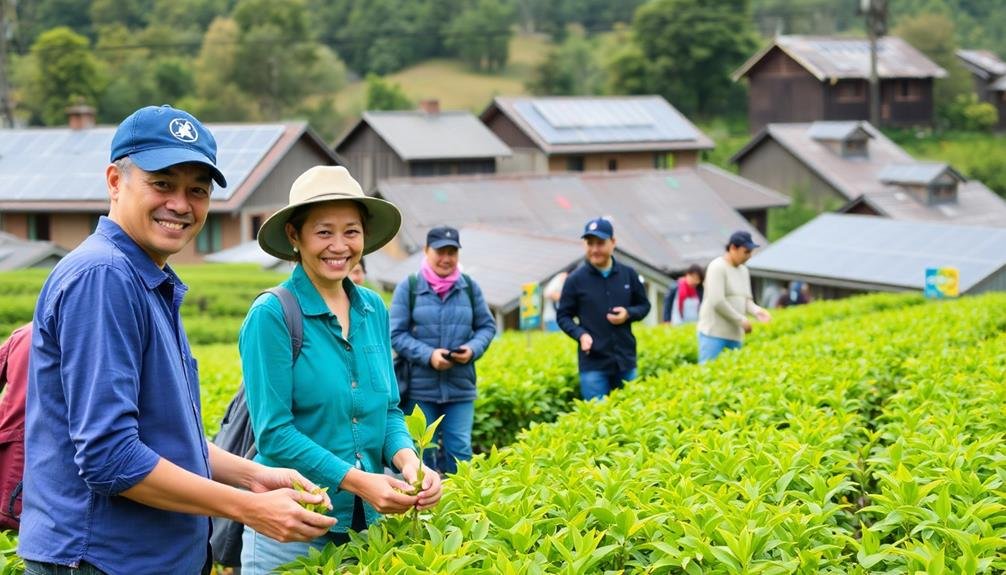
Supporting local tea communities is an essential aspect of sustainable travel to eco-friendly tea farms. When you visit these farms, you're not just enjoying a cup of tea; you're directly contributing to the livelihoods of local farmers and their families.
By choosing to support these communities, you're helping to preserve traditional tea-making techniques and cultural practices that have been passed down through generations.
Your visit can have a significant impact on the local economy, providing income opportunities beyond tea production. Many eco-friendly farms offer:
- Homestay accommodations with local families
- Guided tours led by community members
- Workshops on traditional crafts and cooking
- Local markets selling handmade products
These initiatives help diversify income sources for tea-growing communities, making them more resilient to economic fluctuations.
Additionally, your engagement with local residents can foster cross-cultural understanding and appreciation. By learning about their way of life and the challenges they face, you'll gain a deeper appreciation for the tea you drink and the people behind its production.
This connection can inspire you to become a more conscious consumer and advocate for fair trade practices in the tea industry.
Frequently Asked Questions
Are Tea Farm Visits Suitable for Children or Elderly Travelers?
Tea farm visits can be suitable for children and elderly travelers. You'll find many offer accessible tours and activities. Kids can enjoy interactive experiences, while seniors can appreciate the serene atmosphere and gentle walking paths.
How Physically Demanding Are Eco-Friendly Tea Farm Tours?
You'll find eco-friendly tea farm tours generally aren't too demanding. They often involve leisurely walks through fields and light activities. However, some may include steeper paths or longer hikes, so it's best to check specific tour details beforehand.
What Is the Best Time of Year to Visit Sustainable Tea Farms?
You'll want to visit sustainable tea farms during the harvest season, typically spring or early summer. It's when you'll see the most activity and get the freshest tea. Check with specific farms for their peak times.
Can Visitors Purchase Tea Directly From the Farms They Visit?
Yes, you'll often find that sustainable tea farms offer direct purchases. You can buy freshly harvested teas, sample unique blends, and even take home specialty products. It's a great way to support local farmers and enjoy authentic flavors.
Are There Accommodation Options Available on or Near Eco-Friendly Tea Estates?
You'll often find accommodation options near eco-friendly tea estates. Many farms offer on-site lodging, from cozy guesthouses to luxury eco-lodges. Nearby towns also provide hotels and B&Bs for those who prefer to stay off-site.
In Summary
You've discovered why eco-friendly tea farms are ideal for sustainable travel. You've learned about organic production, fair trade practices, and biodiversity conservation. You've experienced cultural immersion and traditional brewing techniques. You've even harvested tea yourself and seen zero-waste operations firsthand. By visiting these farms, you're supporting local communities and sustainable agriculture. Your tea-drinking experience will never be the same, and you'll carry these memories with you long after your journey ends.

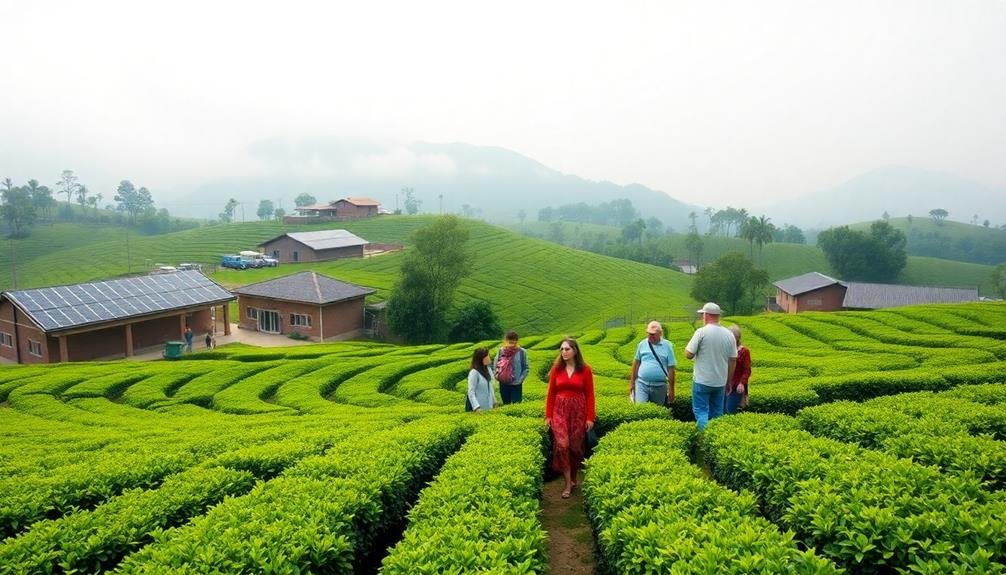

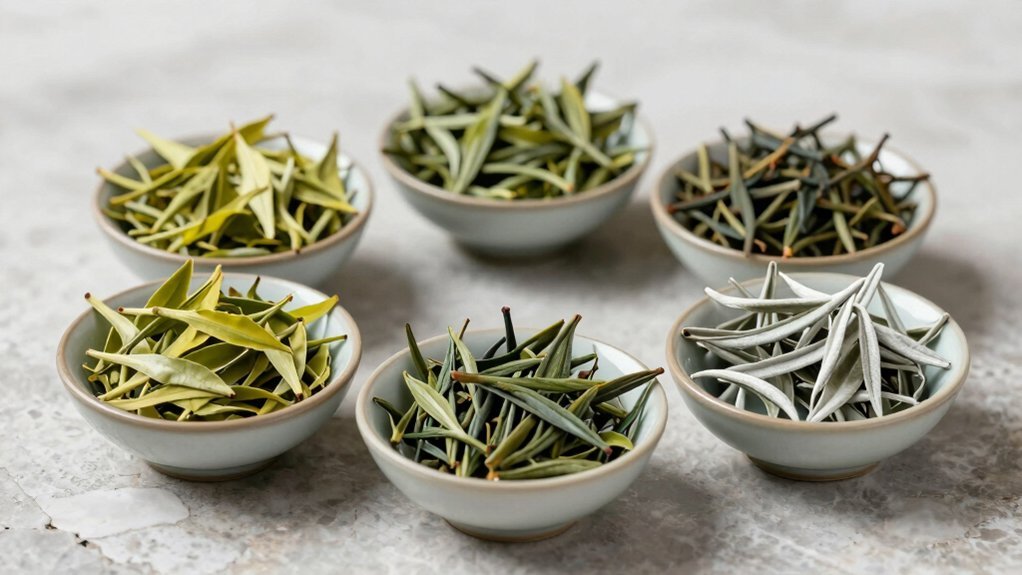

Leave a Reply